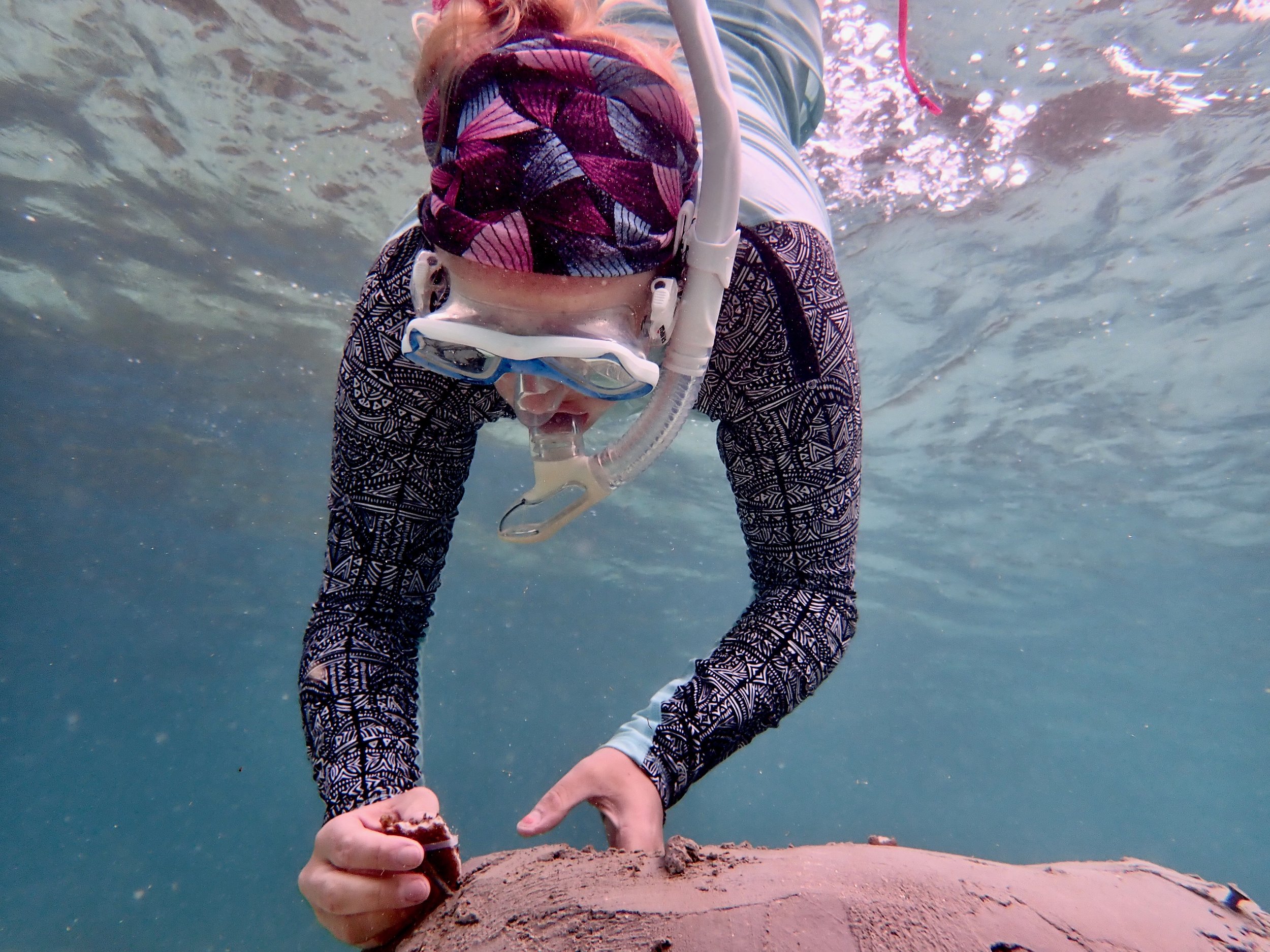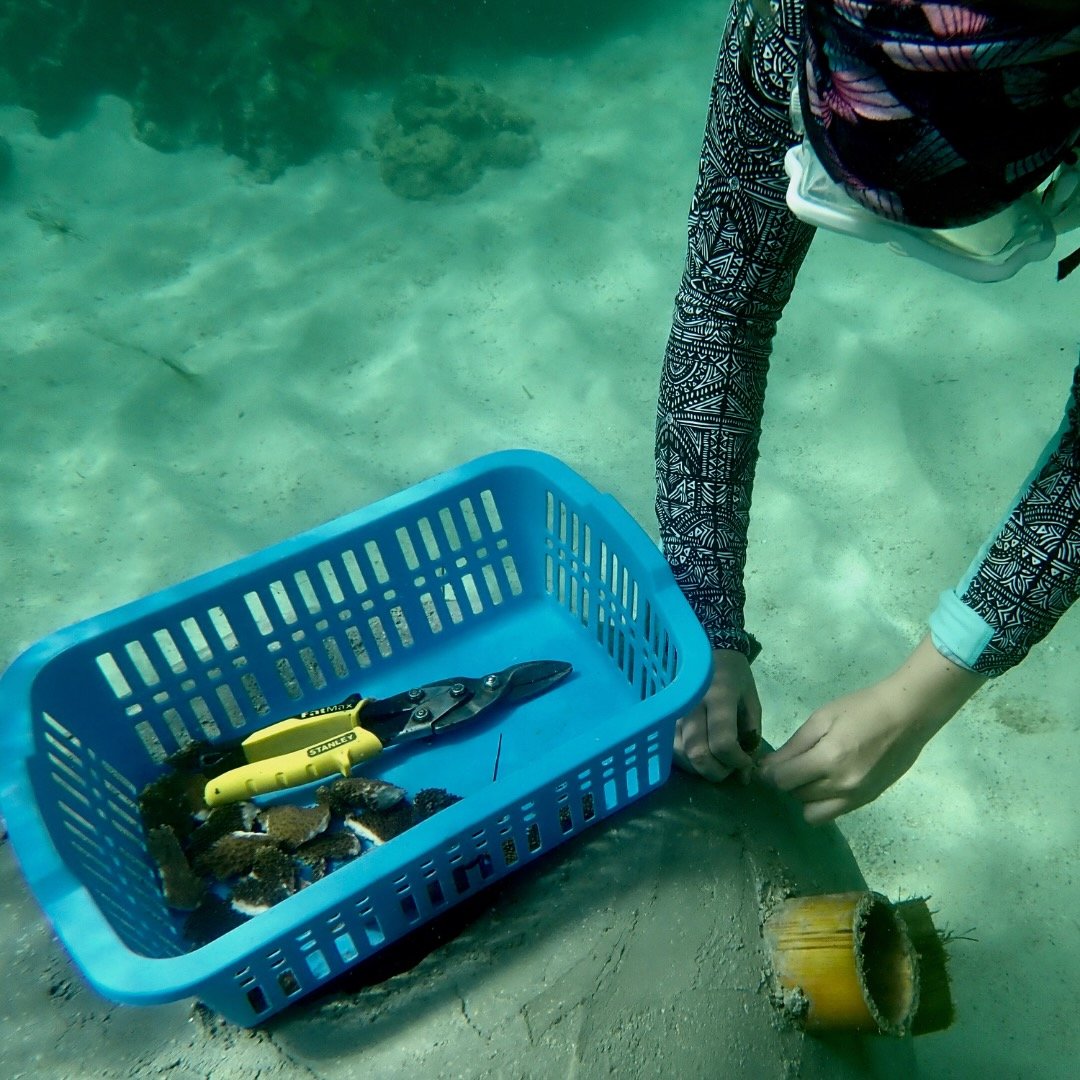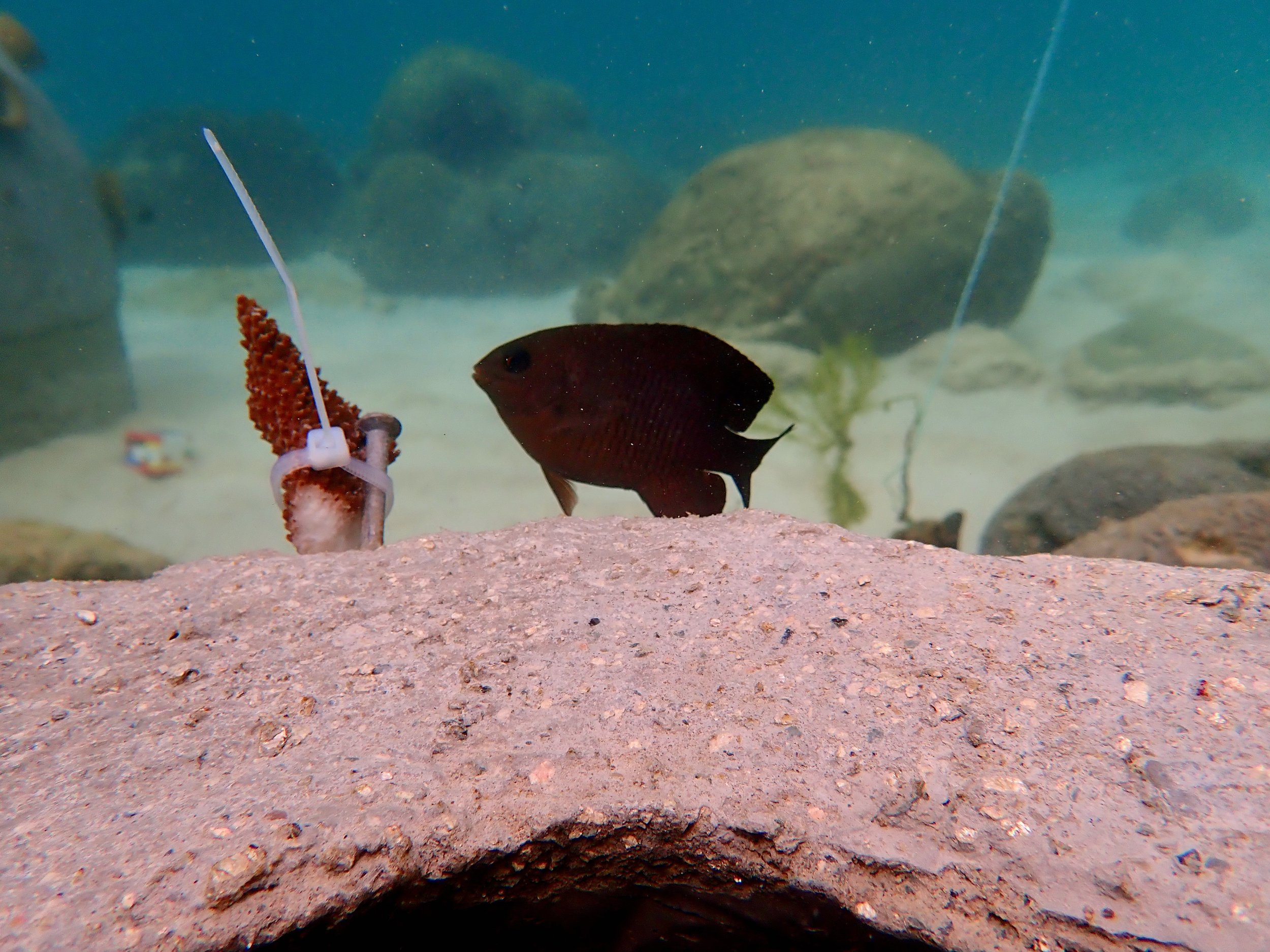Seeding Coral and Conserving Self: An interview with Dr Kath Whittey
By Kath Whittey
Hey! Tell us a bit about yourself.
Hi! I’m Kath, I have a PhD in marine biology and right now I’m in that strange post PhD lull where I feel both incredibly relieved that it’s over (the PhD, the write-up, the viva, the corrections!) but also overwhelmed by thinking about the road ahead. Before I tell you more about my research and what’s next, I wanted to share how I dealt with the end of the PhD and coming out the other side. I think this could be helpful for anyone coming out of any big project, not just after writing a big thesis.
I feel incredibly lucky to have had friends who were a couple of years ahead of me in the PhD process, and a few out the other side too. Actually, just that phrase “out the other side” that really encapsulates how it feels, it is such a huge challenge! So I could see what they were going through after they handed in, and therefore mentally prepare myself for what was coming. But I didn’t just mentally prepare, I had a strategy. I knew I wouldn’t be able to go travelling or do anything spectacular with my low/no funds so I had to do other things. First, I put in place some tasks which I wanted to do during the PhD but didn’t have time for. Simple, I just made a list! For me, on the list there were things like redoing my bedroom, upcycling some old furniture, walking up my local mountains, finally reading some of the books on my list (Little women and Braiding Sweetgrass. Both absolute gems btw), working on my personal website and science communication and doing some volunteer work (for me this was for Women in Ocean Science as blog editor!). You get the picture, small things that give you a sense of purpose and belonging and ways to network and meet new people outside of your PhD bubble. Because when you finish a big project , it feels like your purpose and belonging has been taken away. You even lose your network if you also move away from your University like I did. Someone has pulled the rug out from underneath you.
Knowing that the rug was going to be pulled, during the PhD I made sure I left crumbs for me to find later. I dabbled in teaching, something I could pick up after handing in. I did a SUP instructor course too. All these things were so I had other projects to pick up afterwards. The PhD consumes you, it can become the only thing in your life if you let it. So leave crumbs, or little seeds for yourself to pick up and tend to afterwards.
I also started writing blogs about the PhD experience (I haven’t posted most of them but I plan to!), I found field work pictures and posted field work flash backs on Instagram. This gave me time and space to reflect on all my experiences and learn even more from them. It was a chance to relive them and to move on happily!
I hope that sharing this might be of help to some of you, even if it’s just to know that if you’re going through this post-PhD blues, it’s ok. It’s totally normal! And tell your friends how you’re feeling, they’re there to keep you up!
How did you get to where you are now?
A sort of convoluted path I would say! A path I’m still on. The unexpected turns bring the best adventures, people and experiences and I’m very grateful of them.
I did my undergraduate degree in Biology at Cardiff University and this included a year abroad. During those first two years I was a complete fish out of water, I didn’t understand the whole academic scene, I certainly had no idea what a PhD was or that you could have a career as an ecologist. I’d seen marine biologists on the tv but had no comprehension of how those people got to there. The moment it started to make sense is when I met my future PhD advisor. I still remember the first time I saw Dr Sarah Perkins. We were on a field course in South Wales and that day we were learning about small mammals. Sarah was in charge that day and to me she stood out from the other academics, and I realise now that she stood out to me because I felt that she was similar to me… for start she was a she! She was also super friendly, absolutely full of beans and was wearing two beanie hats which I just thought was really silly and fun! She also spoke in an engaging way, like she really wanted you to understand what she was saying. To me she was the first person who was speaking to me.
Don’t get me wrong, there are brilliant lecturers at Cardiff University, many of whom I’ve become good friends with over my years there. But as an undergrad I just couldn’t see myself in them in the same way. This is absolutely why we need diversity in STEMM, seeing someone similar to you is so valuable. It makes it all feel possible.
So when Sarah said she was looking for a placement student for Italy I knew I had to go for it. I interviewed and I got it! From there on I learnt what academia actually was! I learnt what science is, and learnt how I could be a part of it.
Can you explain more about what your job entails?
My day-to-day work at the moment is quite a mixture of things! Since my viva (the final test where you essentially ‘pass’ your PhD) I have been looking for the next thing, which means I’ve spent a huge amount of time applying for jobs and also thinking about what I want to do next. I want to continue an artificial reef project I founded during my PhD called Fish Hives. And so I’m looking at fundraising for that project and reaching out to new collaborators and potential funders. I recently was awarded the Challenger Society Stepping Stone Bursary to fund my stay In Tobago to work on the Fish Hive project. That was a huge help as all the current work I do for the Fish Hive project is my own time and self-funded.
How do you hope your voice and work as a marine educator will influence others?
I try to do as much outreach as possible including through the Welsh language. There isn’t enough Welsh language science content out there and so I’m doing my part to generate more content in Welsh. I hope that this will enable more Welsh people to engage with science through our own language.
Additionally, I firmly believe in the need to be a visible female scientist. Just by being here, if only this far down the academic road (which I appreciate is still very early, and I do feel quite junior!) I hope others can see me and believe in their own paths.
Why is it so important to engage the community with your work?
For the Fish Hive project it was essential! We got funds for the project through crowdfunding. The community essentially made the project possible!
This continues to be a particular passion of mine, I believe everyone should be allowed to understand the world around them and to have access to knowledge that enables that understanding is key. It wasn’t until my third year in my undergraduate degree that I learnt of the existence of pink sea fans in Wales. I was so blown away! We have corals in Wales? Welsh corals! Amazing! I realised then that I was a sufferer of “Sea blindness” this phenomenon that we look out at the ocean and we just see a grey expanse of water. This seemed so unfair to me somehow, why couldn’t I know about these creatures? What else is under there that I don’t know about?!
I’m about to start a new role with project siarc as local community organiser in North Wales. So I hope through this work I’ll be able to put energy into this problem of sea blindness and foster stronger relationships between people and the sea.
What has your experience as a woman in marine science been like?
I have been so lucky to have had not only one, but four senior women scientists as mentors directly involved in my research through my career (A small shout out to them here! Dr Sarah Perkins, Dr Jo Lello, Dr Heidi Hauffe and Professor Jo Cable). Additionally, I have so many fantastic female colleagues, friends. They are all incredible. This created a bubble for me. A bubble where I was sheltered from a lot of the disparity in treatment. But I’ve always been aware of it, it’s that vague underlying feeling….it’s still the case that there are far more men in science that women, especially in senior roles.
But I feel a huge drive for change brewing, I’m part of a leadership initiative called Homewards bound, an initiative for women in STEMM. Together we are striving towards a more inclusive form of leadership with the sustainability of the planet at the core of our vision for the future.
It is an absolute honour to be a part of this team but that’s a whole other story! Maybe for another time…
So where do you go from here?
I start my new job with Project SIARC soon! I hope to continue the fish Hive project and long-term I would like to return to academia and research. That is the plan but we shall see where the windy path takes me!
Keep up with Kath by following her on socials: @kathwhittey





